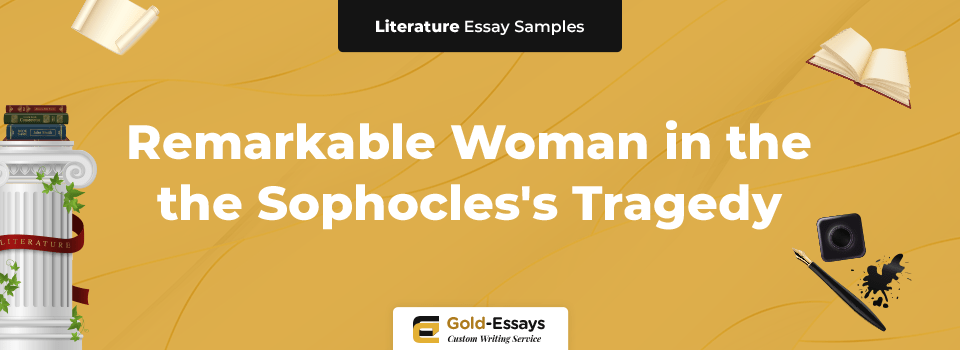
Throughout history, certain women have shaped the course of events with their unwavering resolve and spirit. Sophocles’s Antigone stands as a testament to such indomitable will, embodying virtues of love, devotion, and courage that transcend the ages. This essay juxtaposes Antigone with cinematic heroines like Christine Vole and Katie Morosky, revealing a timeless thread of remarkable womanhood marked by sacrifice and defiance against societal norms.
We'll write an essay from scratch according to your instructions!
Originally, Antigone was one of the episodic figures of the ancient Theban myths about Oedipus. Over time, she grew into a heroine of classical grandeur and nobility. The main thesis of this play is that the heroine is strong enough to go against the ruler for the sake of observance of moral and religious laws. Antigone lives by the principle that morality should engage the whole man (Murdoch 265). Sophocles assesses the crisis in her life as the result of the conflict between the unstable laws of the rulers and the eternal family laws. This brave woman puts morality above any other law, and it is her main tragedy. Without fearing the death, which Creon threatened to those who disobeyed his order not to bury Polyneices, she performs a religious rite of her brother’s burial. The proof of her free will and courage is clearly shown in the following line: I will go alone to lap my dearest brother in the grave (Sophocles 7). Creon ordered to put Antigone in a cave. Faithful to her duty, which is the fulfillment of sacred family laws, Antigone did not accept Creon’s rules. She preferred death to obedience to the cruel king (Sophocles 22). It means that such women as Antigone refute the socially expected female behavior as well as the idea that bravery and hatred of weakness are only masculine qualities.
The main feature of Antigones image is her moral strength. She is sure that she acts correctly when she wants to bury her brother’s body and boldly defies Creon (Sophocles 18). She deliberately goes to meet death, and, till the very end, she feels that she is doing the right thing: My nails are broken, my fingers are bleeding, my arms are covered with the welts left by the paws of your guards but I am a queen! (Sophocles 23). Antigone proclaims this to demonstrate her strength against Creon’s weakness. She does not regret what she has done. The only thing she regrets is that she is dying not mourned by anyone. The example of Antigone shows how strong and fearless a woman can be despite the social and gender expectations (Mead 222). Sophocles sympathizes with Antigone; he depicts her with great warmth and, at the same time, with great respect.
Christine Vole, played by Marlene Dietrich in the film Witness for the Prosecution, as well as Antigone, is a woman who refuses to play by someone’s rules. She is forced to hide her selflessly loving and faithful nature. From her first appearance in the movie, she involuntarily attracts all attention to herself. Magnificent, luxurious, simply inimitable and unforgettable, beautiful, sensual, passionate, and at the same time cold, Christine evokes so many feelings, emotions, and suspicions that all other characters involuntarily recede into the background. The standard opinion of men was that nothing intellectual could be expected of women. The patriarchal society thought that even the best woman was intellectually inferior to the worst man (Woolf 41). However, Christine is a woman who completely refutes this wrong idea. Like Antigone, she is loyal and loving, but she uses clever and witty methods and tricks to save her beloved husband from prison.
Like Antigone, Christine Vole does not accept the rules of the English society. However, her behavior is completely different from that of Antigone, as she uses many contrivances. However, the main thesis of the movie is that Christine’s self-sacrifice is motivated by an unbelievable devotion to a beloved person. Such women have enough strength not only to defend their positions, but also save their men. This remarkable woman sets an amazing performance, which reveals its true meaning at the very end of the film.
Unlike Antigone, who remains the same from the very beginning of the play till its end, Christine Vole is constantly changing. So the viewers are interested in her personality, because her cunning and witty transformation from a loving spouse, who can do anything for her beloved husband, to a cold-blooded, calculating woman is very intriguing. Unlike the honest, resistant, and stable Antigone, Christine is a cunning femme fatale. This can be seen in her following phrase: “I never faint because I am not sure that I will fall gracefully, and I never use smelling salts because they puff up the eyes” (Witness for the Prosecution). However, the prudence of the character is only a mask that covers the passionate and unbridled nature. At first glance, in the courtroom, she is laconic and dispassionate, and, unexpectedly for everyone, she coldly refuses her husband’s alibi (Witness for the Prosecution). However, as a result of her great actor’s tricks, her husband, the murderer, is justified.
Christine can be considered a victim of her feelings. The author assesses the crisis in her life as a result of blind love, as she is devoted to self-oblivion. Once she said that her husband Leonard worships the ground she walks on (Witness for the Prosecution). However, he couldn’t care less for her. While Leonard’s facade of innocence hides a heartless, selfish murderer, Christine’s cool, icy exterior conceals a woman who is desperately in love with her husband and wants to save him at any cost, even though she knows that he is guilty. It means that her tragedy is in her devotion to a selfish and indifferent man.
As for the character of the movie The Way We Were, Katie Morosky, she does not sacrifice her life like Antigone, but she is strong enough to defend her views on life, society, and politics. She always supports her solid moral principles. This is the main thesis of the film. This is a story about a strong personality, who goes to the end, whatever she does, just like Antigone. Katie is depicted as a young radical Jewish female activist, played by Barbara Streisand. The author assesses the crisis in her life as an inconsistency between her personal life and political activity. Her tragedy is in her strength and in defending her moral principles, which are above all other things for her (Murdoch 265). She is constantly engaged in all sorts of social activities, joining organizations of a mainly left-wing persuasion, fighting against the dictatorship and for democracy.
She is not considered an attractive woman, but the power of her personality and wit is far more attractive than physical beauty. It is her passion for politics and compassion for humanity that captivate Hubbell Gardner and lead to their marriage. However, there are frequent quarrels on this ground later, and, eventually, the family union collapses. When Katie finally decides to stand up for what she believes in, Hubbell cannot accept her autonomy. The disagreements about the importance of politics have led to their divorce. She is an idealist and perfectionist, and wants everything and everybody to be better. When Hubbell says that people are more important than their principles, Katie responds: People are their principles (The Way We Were). The whole Katie’s character is in these words. Another phrase, which characterizes this remarkable woman, is the following: If I push too hard, it’s because I want things to be better, I want us to be better (The Way We Were). She is a rather complicated woman, but she never gives up.
writing service
research
develop your paper
to your e-mail
on plagiarism
account at our site
Despite her political and social activity, it can still be said that, unlike Antigone, Katie is not a victim of society or government rules. She is a victim of herself. The issue of gender has also caused problems in the relationship between Katie and Hubbell. In fact, her husband does not accept her devotion to politics. Gender expectations of Hubbell do not coincide with Katie’s type of character. However, as Margaret Mead writes, if those temperamental attitudes such as passivity and willingness to look after children, which are traditionally regarded as feminine, can so easily be found both in men and women, it is wrong to regard these aspects as sex-linked (Mead 221). It is generally accepted that masculinity requires every man to be a strong and resolute warrior, capable of defending women and children from any attack. However, many men cannot live up to those expectations (Greer 377). The same happens with women, whose behavior does not coincide with general gender expectations. The bright examples are such women as Katie and Antigone. Of course, they are devoted and responsive, but they are also active and powerful.
There is a stereotype that women are fragile creatures that require attention and care; however, females often show such strength and endurance that they can even be envied by men. Such women ruin the stereotypes and social expectations about gender roles. Antigone is an outstanding image created by Sophocles, who has become a symbol of unbending courage and protest against humiliation and obedience to cruel patriarchal rules. There are many other women such as Antigone, who set the goal and fight for it, making their own way. Despite the visible difference between Antigone and the twentieth-century women, depicted in the cinematography, such characters as Christine Vole in Witness for the Prosecution and Katie Morosky in The Way We Were have a lot in common showing great willpower, purposefulness, and intolerance towards the rules of the society, in which they lived.
